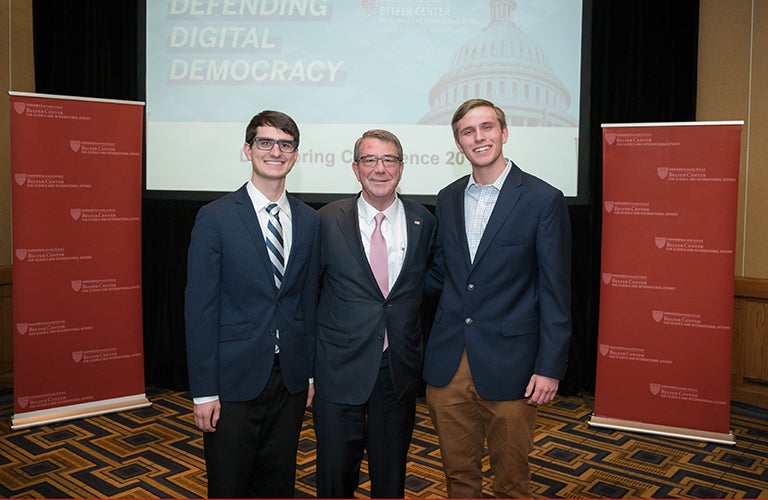Georgetown Team Wins Hackathon With Fact-Checking Proposal
April 30, 2018 — Fact-checking news as you consume it can be tedious. Two Georgetown College computer science majors want to change that.
A proposal from Chris Ferris (C’20) and Sean Letendre (C’20) won first prize in its category at a hackathon hosted by the Belfer Center for Science and International Affairs at the Harvard Kennedy School of Government last month.
The Defending Digital Democracy Hackathon featured teams of students who submitted competing proposals to better secure elections and preserve democracy in the digital age. Judges included former Secretary of Defense Ash Carter, former campaign managers for Hillary Rodham Clinton and Mitt Romney, and officials from government agencies, technology firms, and think tanks.
Ferris and Letendre won the $5,000 first prize in the Technical Method Project Design or Concept category, which required competitors to “Develop a project proposal or system design for a technical method to stop information operations from exploiting social media platforms.”
ACTIVE PARTICIPANTS
When Ferris and LeTendre heard about the Hackathon from alumna Sara Carioscia (C’17), they immediately saw an opportunity that could put their skills to good use at the epicenter of government and cybersecurity.
“We wanted to seize the opportunity to become active participants in the effort to hinder the spread of misinformation,” Letendre said.
“I feel news organizations and politicians have discussed the problem of information attacks damaging democratic systems at length, but have failed to propose and implement effective solutions,” Ferris added. “I was also attracted by the cash prizes.”
The two submitted a two-page concept proposal and were selected as one of three finalist teams that would travel to Cambridge, Mass., to present their ideas to the judges.
SOCIAL FACT CHECKING
Ferris and Letendre’s concept seeks to directly address the problem of unreliable or false “news” spreading over social networks without making a dramatic change to user experiences.
Titled “Social Fact Checking,” the concept encourages a large base of verified users to correct claims made in trending articles and posts, and then non-intrusively inserts these corrections into online content.
As Ferris and Letendre envision it, Social Fact Checking would allow people reading online content to see that a claim is possibly incorrect, click once to see a summary of the evidence against the claim, and click again to see direct links to the underlying sources of that summary.
“By allowing people to know a claim is contested and understand the evidence that contradicts the claim without having to disrupt their reading by going to an external site, our application prevents uninformed people who are concerned with the truth from being influenced by and sharing false information,” Ferris said.
Ferris and Letendre’s proposal finished ahead of finalists from the National Intelligence University and Carnegie Mellon University. The team left with a greater appreciation for the work of cybersecurity professionals.
“We saw what it looks like for representatives of governments and corporations to discuss and collaboratively work towards solutions that defend democracy,” Letendre said.
The Georgetown team hopes to develop a prototype Social Fact Checking software over the next few months, then pitch it to an established media education organization like the Poynter Institute.
CREATIVE SOLUTIONS
The Georgetown team credits their coursework for preparing them to compete in the Hackathon.
“The excellent computer science program allows students to develop technical and problem-solving skills and gives students experience working collaboratively on teams to solve problems,” Ferris said. “Having gone through some of this program helped me at the Hackathon.”
In addition to their computer science classes, Ferris and Letendre are pursuing majors in government and mathematics, respectively. Ferris believes these interdisciplinary academic plans gave them an additional edge.
“In my government coursework, I have been encouraged to think about creative solutions to political issues,” Ferris said.
— Patrick Curran
